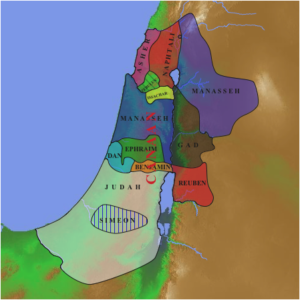What’s in the Text?
Both Joshua and Judges tell the story of the Hebrew people’s entry into Canaan after their wandering in the wilderness, and both relate their early occupation of that land.
Joshua
Chapters 1—12 of the book of Joshua tell the story of a violent military campaign in which “all Israel” is led by Joshua against the people of Canaan. Chapters 13—21 relate the distribution of the land among the victorious tribes of Israel. The final chapters (22—24) focus on the debt of the Hebrew tribes to their God who has given them the land.

This final section may itself be divided into three smaller sections. Chapter 22 relates the return of the warriors of the tribes of Reuben and Gad and half the tribe of Manasseh to their people. They had been given land earlier by Moses on the eastern side of the Jordan river with the agreement that they would go into Canaan (west of the Jordan) and fight to win the land for the other tribes. When the war of conquest is over, they return to their families on the eastern side of the Jordan.
In chapter 23 Joshua gives a farewell speech in which he reminds the people that their success depends on allegiance to the Lord. The people are then gathered at Shechem (in what would centuries later become the region of Samaria) for a ceremony to renew their commitment to the covenant (Joshua 24).
Judges
The book of Judges opens with a restatement of the settlement of the land (1:1—2:5). The bulk of the book (2:6—16:31) is a collection of short stories about particular heroes who have come to be called “judges.” The final chapters (17—21) tell about the tribe of Dan moving north and the punishment of the tribe of Benjamin in a civil war. The material within each of these broad sections is more loosely organized than the material in Joshua.
The first half of the book presents a cycle in which the people abandon the Lord and are then abandoned by the Lord; they cry out to God and God has compassion on them by raising up a leader to deliver them and return them to divine favor. In the last half of the book, though, after Abimelech attempts unsuccessfully to make himself king (chapter 9), the author presents a steady decline in the people’s faithfulness to the Lord.
The collection of short stories in 2:6—16:31 focusses on heroes—charismatic leaders who delivered the people at some point of crisis. These stories usually end with the formula “and [heroe’s name] judged Israel [number] years.”
We should ask what it means to say they “judged” Israel. Clearly, it does not mean what we typically mean by the term “judge” in our modern context. Most of these leaders are not shown carrying out any judicial function (with the notable exception of Deborah). Here are the locations of stories about some of the more prominent Judges:
- Ehud (Judges 3:12—30)
- Deborah and Barak (Judges 4—5)
- Gideon (Judges 6—8)
- Jephthah (Judges 11—12)
- Samson (Judges 13—16)
Take a few minutes now to look at the biblical text to find the stories of Deborah, Gideon, and Samson.
These stories present a pattern for understanding the interaction between the people and the Lord. This pattern illustrates a theme that is stated explicitly in 2:11—3:6. First, the people turn away from their Lord and begin to worship other gods. Then the Lord becomes angry and allows them to be oppressed. After a period of oppression the Lord begins to have compassion and raises up a judge to lead the people. As soon as the judge dies, however, the people turn aside again and begin to worship other gods, and the cycle begins again. As the book progresses, the people become less and less faithful.